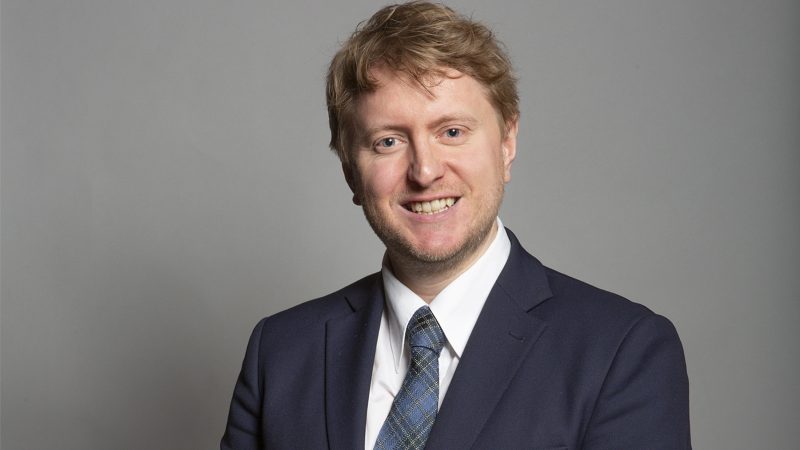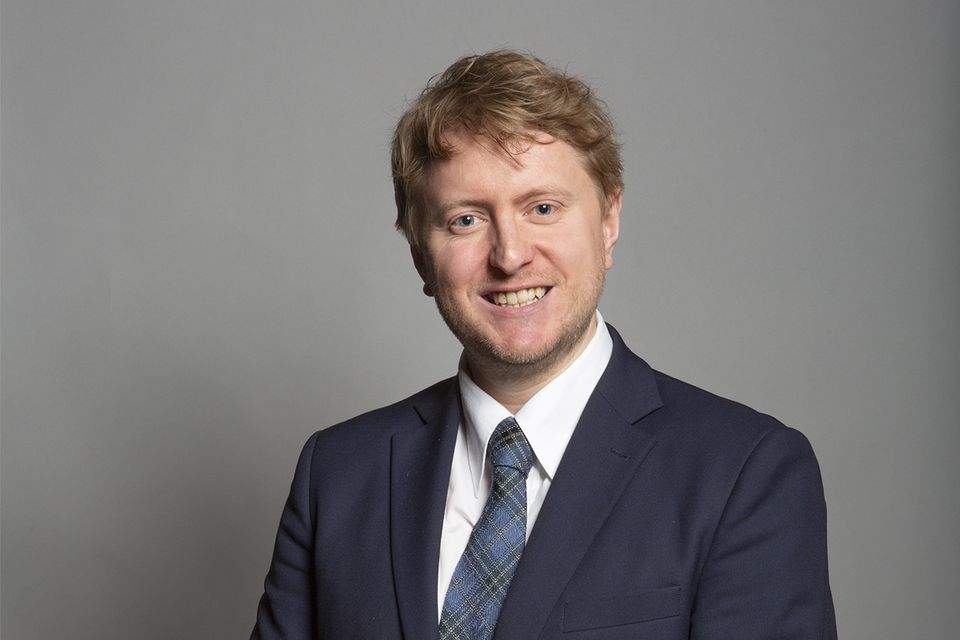UK
TRIFECTA #3 DEFECTOR
We need a new Government': Former Conservative MP Mark Logan defects to Labour
30 May 2024,

Former Conservative MP Mark Logan has said he is backing Labour at the next general election, saying the party could "bring back optimism into British life".
Mr Logan, who represented Bolton North East for the Tories until Parliament dissolved on Thursday, said had been on a "journey" and now offered "centrist politics".
He told the BBC the was "unrecognisable" from the party he joined a decade ago.
He said his application to join Labour was "going in today", describing party as having been on a "journey" and now offering "centrist politics".
He told the broadcaster: "I believe, as a politician, it's incumbent upon me to be able to say, to look people in the eyes in Bolton and say that I believe that a Labour government is going to serve you better, your interests better, it's going to be better for your pockets, it's better for the economy, it's going to be better for the UK."
Follow the for all the twists and turns of the campaign train and listen live to LBC on , our official app

It follows a series of defections during the last Parliament, including the former MP for Dover, Natalie Elphicke, who was on the right of the Tory Party.
Meanwhile, Dan Poulter - another former Tory MP - quit the Tories and crossed the aisle to Labour over the current state of the NHS.
Read More
Read More:
Mr Logan won his seat from Labour in the 2019 general election with a narrow majority of just 378, making it one of the most marginal in the country.
He was a junior member of the Government, a parliamentary private secretary to ministers in the Department for Work and Pensions.
The defection comes as a row over whether the Labour veteran Diane Abbott will be allowed to stand for the party at the upcoming election
It was reported earlier this week that
Ms Abbott confirmed this, but the Labour leader Sir Keir Starmer said "this is not true" and that "no decision has been taken".
The row deepened earlier today when Sir Keir's deputy,
Mark Logan: Who is the Tory Bolton North East MP who has defected to Labour?

The Conservative MP Mark Logan has announced his defection to Labour, suggesting “things can only get better” under a Labour government led by Keir Starmer and signalling he was unhappy with the government’s stance on Gaza.
The MP posted a statement on Thursday night, in a development Labour figures will hope starts to shift the news agenda away from bitter internal rows over candidate selections and what critics dub a “purge’ of the left – after Faiza Shaheen and Lloyd Russell-Moyle were deselected and Diane Abbott’s future hangs in the balance.
Logan said he had “consistently lobbied the UK government” over Gaza, and said he wanted an immediate cessation of hostilities and recognition for Palestine.
Logan has represented Bolton North East since 2019, when he won the “red wall” seat from Labour, and his defection is likely to be seen as another blow for Prime Minister Rishi Sunak’s chance of holding onto voters persuaded to vote Tory for the first time by Boris Johnson in 2019.
Logan only had a majority of just a few hundred votes, however, and on current polling is likely to have lost his seat.
It follows the defection of Natalie Elphicke a few weeks ago, which sparked a significant backlash within Labour, and it remains to be seen whether Logan’s defection could also spark fresh tensions. He has said he will not contest the seat at the general election.
Logan’s page on the Conservatives’ website, now deleted, previously said his working life included working as a diplomat in China. “Immediately prior to the election he worked in the private sector where he is involved in international business – an important skill as we leave the European Union and export ‘Global Britain’ to the rest of the world,” it once read.
His own website, which also now appears to be down, previously said he is “not a career politician having worked in business before and after serving the UK in the Foreign Office”. He was a “senior executive in a multinational company, and was most recently a senior director in a leading management consultancy”.
It said he “believes too many people in parliament have worked in the political and London bubble for too long, and thus are detached from the realities of life in modern Britain”. The MP “wants to serve every person and family in Bolton North East so that people are heard and can live their lives in peace and prosperity”.
It also said he was committed to bringing extra police, NHS and school funding, entrepeneurs and foreign investment to Bolton.
NI-born Tory MP: I’m backing Labour at General Election
Mark Logan MP.
Brett Campbell Today
A Northern Ireland-born former Conservative MP is backing Labour at the General Election after claiming Sir Keir Starmer’s party could "bring back optimism into British life".
Mark Logan, who is from Ballymena and was sworn into the House of Commons in Ulster Scots, represented Bolton North East for the Tories until Parliament dissolved on Thursday.
He told BBC News Labour had been on a "journey" and now offers voters "centrist politics" while taking a swipe at the Conservative Party which he described as "unrecognisable" from when he joined a decade ago.
Mr Logan, who won his constituency seat with a majority of just 378 back in 2019 making it one of the most marginal in the UK, said his application to join Labour was being submitted today.
The Brexit supporter is standing down at this election.
However, he won’t be running as a Labour candidate in his former constituency as the party has already chosen a candidate, but he is hoping he can run for Westminster elsewhere
"The time has come to bring back optimism into British public life," he said while explaining his decision.
Mr Logan compared the mood of the country to New Labour's 1997 election campaign and subsequent landslide victory.
"When I look back to my teenage years, in 1997 when Labour came to the fore at that time and we obviously heard the song Things Can Only Get Better, I feel that we're at that point again in British politics and British history," he said.
"For my constituents and for the country, it's right that we get some stability back into the UK, we get optimism, we get new and fresh ideas."
The former businessman and diplomat did not criticise Rishi Sunak who he backed to become Tory leader and said the prime minister could "leave politics with his head held high" if he loses the election.
"It's more about not the push factor of Conservatives, but the pull factor of Keir Starmer, the new cabinet that would come in, the fresh faces, the fresh ideas," Mr Logan said.
The outgoing MP admitted he had been considering backing Labour "for quite a long period" and felt that now was the right time to publicly support the party "because the electorate did vote me in as a Conservative MP".
“I believe as a politician it's incumbent upon me to be able to say, to look people in the eyes in Bolton and say that I believe that a Labour government is going to serve you better, your interests better, it's going to be better for your pockets, it's better for the economy, it's going to be better for the UK,” Mr Logan added.
it comes just three months after he broke ranks with his party to demand an immediate ceasefire in Gaza conflict after accusing Israel of going “too far".
Labour shifted its position to back an immediate humanitarian ceasefire, following pressure on the party around the same time.
When asked if Sir Keir has now got it right on the conflict, Mr Logan said he believed Labour was "best placed to deal with what's going to come down the track".
Two other MPs, Natalie Elphicke and Dan Poulter, defected from the Tories to join Labour earlier this month and briefly sat as Labour MPs before the dissolution of Parliament.
Analysis
Defecting Tory may be at odds with the government - but he isn't quite Labour either
Mark Logan made the shock announcement on Thursday and is now thought to be seeking a seat under Sir Keir Starmer's banner.
Jon Craig
Chief political correspondent @joncraig
SKY NEWS
Thursday 30 May 2024 
In a Sky News interview after then Tory MP Christian Wakeford defected to Labour in 2022, Mark Logan was asked if he planned to join him.
At the time, he laughed and replied jokingly: "I'm not planning to defect - to the Democratic Unionist Party."
Sponsored link
Yet two years later, Mr Logan has indeed - like Mr Wakeford, Dan Poulter and Natalie Elphicke in the parliament that has just ended - abandoned the Conservative Party and switched to Labour.
Follow live:
Corbyn accuses Starmer of 'intervening' with left wing 'purge'
In his shock statement announcing his defection, Mr Logan said he had done "much soul-searching throughout my first term in parliament".
Not many politicians admit to that sort of self-doubt. But then Mr Logan has never been tribal like the more bombastic and shouty members of the Tories' 2019 intake. You know who you are!
Nor is he a divisive figure like the most recent previous Tory defector to Labour, Natalie Elphicke, whose welcome from the party leadership appalled some Labour MPs and activists.
And though he won his seat from Labour's Sir David Crausby, who represented Bolton North East from 1997 until 2019, it's not a Red Wall seat.
Follow Sky News on WhatsApp
Keep up with all the latest news from the UK and around the world by following Sky NewsTap here
It was represented by the Conservative Peter Thurnham from 1983 until he became an independent, before joining the Liberal Democrats in 1996.
So Mr Logan is not the first representative for Bolton North East to quit his party and join a rival.
He was born in Ballymena in County Antrim and graduated from Queen's University, Belfast, before doing master's degrees at the London School of Economics and Wadham College, Oxford.
Before becoming an MP he was a Foreign Office diplomat at the British Consulate-General in Shanghai. He's fluent in Mandarin and has learned Japanese since being elected in 2019.
In the 2017 general election, he fought East Antrim, the seat represented by the DUP's Sammy Wilson, for the Conservative Party and came sixth with a derisory 963 votes.
But the Brexit-backing candidate won Bolton North East by just 378 votes in 2019, and has faced the relentless stress of representing a seat with a tiny majority.
The seat has a large Muslim community and Mr Logan has been a strong advocate for Gaza, while being a bitter critic of Israel and its response to the Hamas attacks on 7 October last year.
But he hasn't just been a Gaza rebel. He quit as a parliamentary private secretary, the lowest rung on the ministerial ladder, to Northern Ireland ministers in 2022 in protest at Boris Johnson's "partygate" and the Chris Pincher "groping" scandal.
When Rishi Sunak became prime minister, Mr Logan became a PPS to Department for Work and Pensions ministers.
Sunak ally Mel Stride, the secretary of state, won't be pleased by his defection.
Now he's backing Sir Keir Starmer for prime minister, he hopes to be a Labour candidate.
But his views on Israel and Gaza, as well as being at odds with the Conservative government, are not quite mainstream Labour either.






